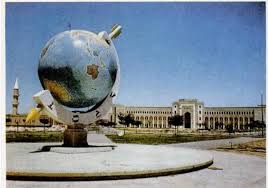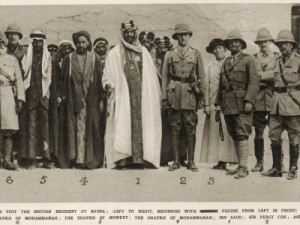“King Salman of Saudi Arabia promoted his 31-year-old King Salman of Saudi Arabia promoted his 31-year-old son, Mohammed bin Salman, to be next in line to the throne on Wednesday……As defense minister, he also had primary responsibility for the kingdom’s military intervention in Yemen, where it is leading a coalition of Arab allies in a bombing campaign aimed at pushing Houthi rebels from the capital and at restoring the government. That campaign has made limited progress in more than two years, and human rights groups have accused the Saudis of bombing civilians, destroying the economy of what was already the Arab world’s poorest country, and exacerbating a humanitarian crisis by imposing air and sea blockades.Prince Mohammed has taken a hard line on Iran……….” N Y Times
Arab kings, potentates, oligarchs, and assorted dictators have often preferred their sons (or other kin) to succeed them.
King Hussein of Jordan had his brother Prince Hassan as his crown prince for many decades. That was how the ruling Hashemite family had decided when young Hussein took the throne. But when Hussein felt his mortality approaching in the 1990s, he dumped his brother in favor of his eldest son Abdullah (from his British wife).
But there was a catch: King Hussein stipulated that his other son Hamza, from his American wife Lisa Halaby, become crown prince. This did not last long after Abdullah took the throne: he soon sidelined his half brother Hamza and appointed one of his sons as crown prince.
Hafez Al Assad (the not-king) of Syria had allegedly set his eldest flamboyant son Basil to succeed him. Basil died in a car accident, and Bashar, being trained as an eye doctor in London, was brought home to learn the ropes. The rest is history.
The most relevant to the events of today in Riyadh occurred in Baghdad in 1979. Perhaps a few years before. Vice President Saddam Hussein became the real power behind the Baath rule of his cousin Al Bakr from the early 1970s.. In 1979 he staged his own palace coup, forcing Al Bakr into retirement. Al Bakr and many of his close associates died soon after, in the usual Iraqi Baathist fashion.
Even more relevant to the recent Saudi events, Saddam was facing rebellion and discontent from minorities inside Iraq. Similarly, he was contemplating what to do about his revolutionary neighbors next door in Iran. Saddam also had the support of most Western powers and most Arab oligarchs (with the exception of Syria, some Palestinian factions, Libya, and Algeria).
About one year after taking power, Saddam saw messy revolutionary factional Iran as an easy target to help him consolidate his power over the region. He invaded Iran without having first read the history of the German Operation Barbarossa that started in 1941. He got bogged down in Iran for eight years, lost some territory, was forced by a stalemate to sue for peace. His country ended the war bankrupt and deeply in debt to the tune of almost $200 billion (I had estimated in a paper that Iraq enjoyed tens of billions of foreign reserves before that war).
That was the beginning of the end for Saddam and the old order in Iraq. He invaded Kuwait to regain his financial losses, and thus eventually finished his bloody career hiding inside a hole near Baghdad. Before he was tried for three years and hanged.
Now we have a young man rise to power in Saudi Arabia. He has managed to push every rival aside, just like Saddam Hussein did in Iraq in the 1970s. He has also started a messy unending war in Yemen. Two and a half years of bombings by Saudi warplanes, with American and British help, have killed many thousands of civilians in Yemen and destroyed its infrastructure. Genocide with lipstick is still genocide.
With failures in Yemen and Syria under his belt, the new Saudi prince in power is looking across the Persian Gulf for a new adventure. Apparently being egged on by the greed and reckless rhetoric of Donald Trump and some paid American journalists and think tanks, he is talking of taking a war into Iran. Even as his own country, the most-expensively armed in the region, is bleeding in Yemen against lightly-armed Houthis and Saleh allies. He is also targeting his former ally Qatar with an economic blockade. He might even threaten other GCC members in due time.
Can this prince see the light and avoid another war he expects the Americans to help him wage?
Saddam Hussein is dead, but modern day Arabs often tend to repeat the worst of past mistakes. Already some approved writers in Saudi media are shouting: “Saddam is dead, long live Saddam“.
Cheers
Mohammed Haider Ghuloum





